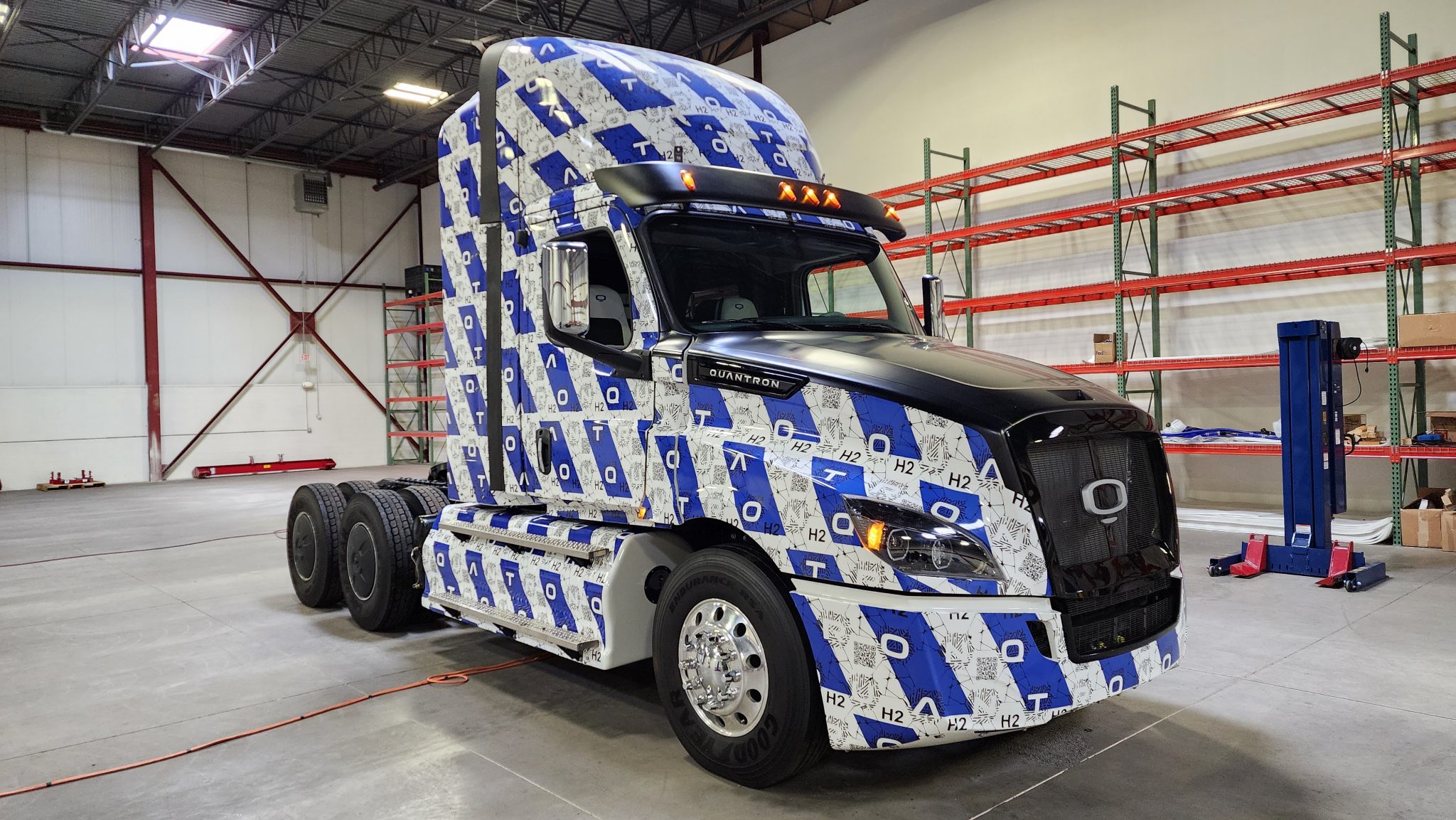Hydrogen represents an option to electrify the trucking industry and beyond
Hydrogen-powered trucks could eliminate long charge times in the deadline-driven freight business.

FILE - A hydrogen semi-truck sitting inside Quantron's Auburn Hills, Mich facility.
Detroit’s automakers have been pushing to add more electric vehicles to their showroom lineups. But while standard EVs may be the focus for car companies, other vehicle sectors have their eye on a different kind of battery power — hydrogen.
Listen: Trucking industry shifting towards hydrogen power for transport vehicles
How hydrogen-powered trucks operate
Vehicles like Ford’s Mustang Mach-E or Chevrolet’s Silverado EV pickup use electricity from a battery to make the wheels turn.
Hydrogen electric vehicles are similar. But instead of getting a charge by plugging into an outlet, hydrogen stored in a fuel cell is compressed to create electricity, which is then stored in a battery.
“In Michigan, there’s zero infrastructure for this kind of a vehicle.” – Richard Haas, Quantron U.S.
“Fuel cells seem to be particularly suited if you’re doing more cross-country driving, if you have longer daily routes, if you’re in an area maybe where there isn’t any electrical infrastructure to charge,” says Richard Haas, president and CEO of Quantron U.S.
Quantron U.S. is developing hydrogen semi-trucks. Haas says while a traditional EV might work best for a daily commute, hydrogen could be better for long distance transport.
“This vehicle we’re designing for up to 750 miles,” Haas shares while standing in front of a hydrogen semi. “At some point we think it’ll maybe be closer to a thousand miles and the refueling time is about 10 minutes.”
That’s a fraction of the multi-hour charge time for cars and trucks that run on batteries alone. But despite that benefit for a freight industry that doesn’t always have overnight to repower, Haas says there’s still some things that need to be done before hydrogen semis can hit the highway.
“There’s some chicken and egg stuff going on,” he explains. “In Michigan there’s zero infrastructure for this kind of a vehicle.”
Building a network of refueling stations
While a network isn’t operational just yet, planning efforts are underway according to Michigan’s 11th District Congresswoman Haley Stevens (D).
“We’ve got mobility here,” says Stevens. “We’ve got the Big Three here, we’ve got the supply chain. And now we’re developing the energy solutions.”
Stevens says Michigan is involved in two separate federal bids to build so-called “hydrogen hubs.” And additional legislation could further help funding.
“Particularly the Inflation Reduction Act,” she explains, “which is providing incentives and some other grant opportunities. But we’re waiting on the rules still a year later for the inflation Reduction Act.”
An investment of $10 million in grant funding is being used to build a “truck stop of the future” in Redford.
Without that clarification, Stevens says people developing hydrogen tech tell her it’s hard to plan the next steps for developing the technology.
“We need some answers from the federal government — from those who are putting into place the rules,” she says.
Despite the lack of confirmation from the Biden administration, hydrogen is still part of Michigan’s long-term vision for commercial trucking. An investment of $10 million in grant funding is being used to build a “truck stop of the future” in Redford.
Gov. Gretchen Whitmer’s chief infrastructure officer, Zachary Kolodin, believes the project will showcase what a potential hydrogen-powered network could look like.
“We’ll need to build a whole spine of fueling stations just like that to support conversion of a freight route from diesel over to hydrogen,” Kolodin says.
And that’s where the hydrogen hubs come in. Beyond refueling stops, Kolodin explains a hub represents all the resources that make up the network.
“You need both production of the hydrogen,” he says, “so electrolyzers, for example, that are producing clean hydrogen on site. Transportation, whether that’s by truck or by pipeline. And then ultimately use.”
The potential for use could be anything from powering a factory to driving a fleet of fuel cell semis.
Adopting hydrogen for broader energy uses
Beyond the trucking industry, other heavy vehicles such as buses could also benefit from access to hydrogen as a power source.
“Some transit operators may choose to go with a battery electric vehicle while others will choose to go with a hydrogen vehicle,” Kolodin says.
And that’s already happening. The city of Detroit is currently piloting four traditional electric buses, while the city of Flint is replacing its remaining diesel buses with hydrogen version.
As hydrogen usage expands in heavy duty vehicles, it could also become a viable option for light duty cars and trucks. Rep. Stevens says it’s something Detroit’s automakers are keeping an eye on.
“The automotive companies themselves, batteries are coming out first, that’s been further developed,” says Stevens. “But they’re not ignoring what opportunity lies with hydrogen.”
Before joining Quantron’s development of fuel cell semi-trucks, Haas worked at electric car manufacturer Tesla. He sees a future where electric and hydrogen vehicles share the road.
“There will be hydrogen uses for longer term,” predicts Haas. “I think maybe it takes off more in rural and semi-rural areas where the infrastructure for battery electric maybe doesn’t come so fast.”
Still, Haas does thinks there will be places in the U.S. that rely on gasoline — even decades from now.
Trusted, accurate, up-to-date.
WDET strives to make our journalism accessible to everyone. As a public media institution, we maintain our journalistic integrity through independent support from readers like you. If you value WDET as your source of news, music and conversation, please make a gift today.

